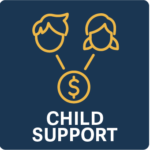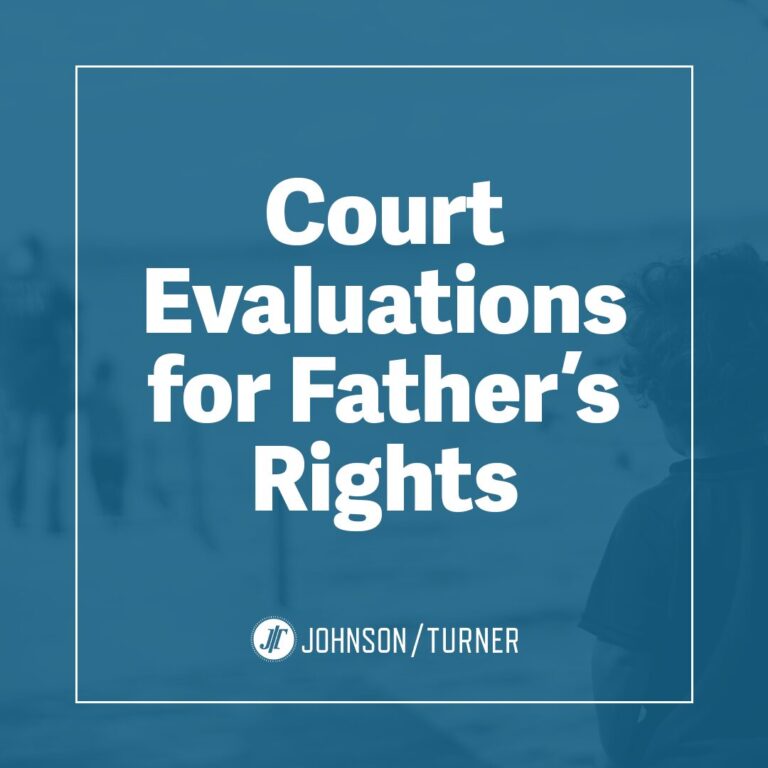Areas of Family Law
Want More Info?
Absolutely no obligation when you reach out for information. You need to make the best decision for you, we hope we can help.

Get Your Questions Answered
Advocating for Your Family in Minnesota
Understanding Your Parental Rights
Navigating parental rights in Minnesota can feel daunting, especially when you’re already dealing with significant family changes. At Johnson/Turner, we understand the challenges and uncertainties you face. Our team is dedicated to providing clear, compassionate, and empowering legal support. Whether you’re dealing with custody arrangements, visitation rights, or child support issues, we are here to guide you through every step of the process. Trust us to help you make informed decisions that prioritize the well-being of your family, ensuring you feel supported and confident in your journey toward a brighter future.

Understanding your parental rights as a father is crucial, especially when navigating the complexities of custody laws in Minnesota. Whether you are married or unmarried, knowing your rights and responsibilities can help ensure the best outcome for you and your child. This comprehensive guide outlines the key aspects of custody laws in Minnesota, providing clarity and support for fathers seeking to protect their parental rights.
Rights of a Married Father
As a married father in Minnesota, you share equal parental rights with your spouse. These rights include:
- Joint Custody: Both parents have the right to make significant decisions about the child’s upbringing, such as education, healthcare, and religious practices.
- Physical Custody: Both parents are entitled to spend time with the child, typically outlined in a parenting plan that details the schedule for each parent.
- Shared Responsibilities: Both parents share responsibility for the child’s welfare, including financial support. Child support is calculated based on both parents’ incomes and the child’s needs.
In the event of a divorce, Minnesota courts generally favor arrangements that support joint custody, allowing both parents to remain actively involved in their child’s life. The court’s primary concern is the best interest of the child, which often includes maintaining strong relationships with both parents.
Rights of an Unmarried Father
For unmarried fathers, establishing parental rights involves additional steps:
- Proving Paternity: Before an unmarried father can exercise parental rights, paternity must be legally established. This can be done through a Voluntary Acknowledgment of Paternity or by court order.
- Petitioning for Custody: Once paternity is established, the father can petition the court for custody or visitation rights. The court will consider the best interests of the child in making its decision.
Establishing paternity grants the father legal recognition as the child’s parent, which is necessary for obtaining custody or visitation rights.
Establishing Paternity
For unmarried fathers, establishing paternity is a critical first step. This can be done through:
- Voluntary Acknowledgment: Both parents can sign a Recognition of Parentage (ROP) form, which legally acknowledges the father’s paternity.
- Court Order: If there is a dispute, either parent can file a paternity suit, and the court may order genetic testing to establish paternity.
Once paternity is established, the father has the right to seek custody or visitation. The court will evaluate several factors to determine the best interests of the child, including the child’s relationship with each parent, the ability of each parent to care for the child, and any history of domestic violence or substance abuse.
Navigating Custody Disputes
Custody disputes can be challenging, but understanding the process can help you navigate it more effectively:
- Mediation: Many custody disputes are resolved through mediation, where both parents work with a neutral third party to reach an agreement.
- Court Proceedings: If mediation fails, the case may go to court. The judge will consider the best interests of the child and may order a custody evaluation to assess each parent’s ability to care for the child.
- Parenting Plan: The final custody arrangement is typically detailed in a parenting plan, which outlines each parent’s rights and responsibilities, as well as the visitation schedule.
Johnson/Turner: Your Partner in Navigating Custody Laws
Navigating custody laws can be complex and emotionally taxing. At Johnson/Turner, we are dedicated to providing compassionate, knowledgeable, and empowering legal support for fathers. Our experienced team will guide you through every step of the process, ensuring that your rights and your child’s best interests are protected.
We understand that each family situation is unique, and we are committed to helping you find the best path forward. Trust us to be your advocates, offering clarity and support as you navigate your journey toward a brighter future for you and your child. Whether you are establishing paternity, seeking custody, or involved in a custody dispute, Johnson/Turner is here to help you secure your parental rights and build a meaningful relationship with your child.
Helpful Resources for Fathers

Navigating custody laws can be a challenging and emotional process for any mother. Whether you are married or unmarried, understanding your rights and responsibilities is crucial to ensuring the best outcome for you and your child. This comprehensive guide outlines the key aspects of custody laws in Minnesota, providing clarity and support for mothers seeking to protect their parental rights.
Rights of a Married Mother
As a married mother in Minnesota, you share equal parental rights with your spouse. These rights include:
- Joint Custody: You and your spouse both have the right to make important decisions about your child’s upbringing. This includes decisions about education, healthcare, and religious practices.
- Physical Custody: Both parents have the right to spend time with the child. This is often arranged through a parenting plan that details the schedule for each parent.
- Shared Responsibilities: Both parents are responsible for the child’s welfare, including financial support. Child support is calculated based on both parents’ incomes and the child’s needs.
In the event of a divorce, Minnesota courts generally favor arrangements that support joint custody, allowing both parents to remain actively involved in their child’s life. The court’s primary concern is the best interest of the child, which often includes maintaining strong relationships with both parents.
Rights of an Unmarried Mother
For unmarried mothers, Minnesota law provides specific protections:
- Automatic Custody: Upon the birth of the child, an unmarried mother automatically has sole legal and physical custody. This means you have the exclusive right to make decisions regarding your child’s welfare without needing to go through the court system.
- Decision-Making Authority: As the sole custodian, you have the right to make all decisions related to your child’s education, healthcare, and living arrangements.
However, if the father seeks to establish his rights, he must first prove paternity through legal processes. Once paternity is established, the father can petition for custody or visitation rights. The court will then consider the best interests of the child, potentially leading to shared custody arrangements similar to those for married parents.
Establishing Paternity
For unmarried parents, establishing paternity is a crucial step. This can be done through:
- Voluntary Acknowledgment: Both parents can sign a Recognition of Parentage (ROP) form, which legally acknowledges the father’s paternity.
- Court Order: If there is a dispute, either parent can file a paternity suit, and the court may order genetic testing to establish paternity.
Once paternity is established, the father has the right to seek custody or visitation. The court will evaluate several factors to determine the best interest of the child, including the child’s relationship with each parent, the ability of each parent to care for the child, and any history of domestic violence or substance abuse.
Navigating Custody Disputes
Custody disputes can be stressful, but understanding the process can help you navigate it more effectively:
- Mediation: Many custody disputes are resolved through mediation, where both parents work with a neutral third party to reach an agreement.
- Court Proceedings: If mediation fails, the case may go to court. The judge will consider the best interests of the child and may order a custody evaluation to assess each parent’s ability to care for the child.
- Parenting Plan: The final custody arrangement is typically detailed in a parenting plan, which outlines each parent’s rights and responsibilities, as well as the visitation schedule.
Johnson/Turner: Your Partner in Navigating Custody Laws
Whether you are married or unmarried, navigating custody laws can be complex and emotionally taxing. At Johnson/Turner, we are dedicated to providing compassionate, knowledgeable, and empowering legal support. Our experienced team will guide you through every step of the process, ensuring that your rights and your child’s best interests are protected.
We understand that each family situation is unique, and we are committed to helping you find the best path forward. Trust us to be your advocates, offering clarity and support as you navigate your journey toward a brighter future for you and your child.

Grandparents often play a vital role in their grandchildren’s lives. However, when family dynamics change, such as during a divorce or the death of a parent, grandparents may be concerned about maintaining their relationship with their grandchildren. In Minnesota, grandparents have specific legal rights that can help them remain involved in their grandchildren’s lives. Here’s what you need to know about grandparents’ rights in Minnesota.
Visitation Rights
Under Minnesota law, grandparents can seek visitation rights under certain circumstances. These rights are not automatic but can be granted by the court if specific conditions are met. Key situations where grandparents can petition for visitation include:
- Death of a Parent: If one of the child’s parents is deceased, the grandparents can petition the court for visitation rights.
- Divorce or Legal Separation: If the child’s parents are going through a divorce or legal separation, grandparents can request visitation, such as when the parent won’t have time with the child.
- Custody Determination: If the child is not living with both parents, such as in cases where the child has been removed from the parents’ custody, grandparents can seek visitation rights.
Factors Considered by the Court
When deciding on granting visitation rights to grandparents, the court considers several factors to ensure the best interests of the child. These factors include:
- Existing Relationship: The strength and quality of the existing relationship between the grandparent and the grandchild.
- Best Interests of the Child: Whether granting visitation is in the best interests of the child, including emotional and developmental needs.
- Parental Objections: The wishes of the child’s parents are taken into account, and a parent’s objection to visitation can significantly influence the court’s decision.
- Impact on Parent-Child Relationship: Whether the visitation would interfere with the parent-child relationship or the parents’ authority.
Legal Process for Grandparents
To obtain visitation rights, grandparents must follow a legal process that involves:
- Petition Filing: Grandparents must file a petition with the court requesting visitation rights. This petition should include reasons why visitation is in the best interests of the child.
- Court Hearing: A hearing will be scheduled where both the grandparents and the child’s parents can present their case. The court will review the evidence and testimonies to make a decision.
- Judicial Decision: The judge will issue a ruling based on the best interests of the child, considering all presented factors.
Custody Rights
In rare cases, grandparents may seek custody of their grandchildren. This typically occurs under circumstances where the parents are deemed unfit or unable to care for the child, such as due to substance abuse, neglect, or incarceration. The process for grandparents seeking custody involves:
- Proving Unfitness of Parents: Grandparents must provide clear and convincing evidence that the parents are unfit to care for the child.
- Best Interests of the Child: The court will evaluate whether awarding custody to the grandparents serves the best interests of the child, ensuring their safety and well-being.
- Legal Guardianship: In some cases, grandparents may also seek legal guardianship, which grants them the authority to make decisions about the child’s welfare without terminating the parents’ rights.
Johnson/Turner: Supporting Grandparents’ Rights
Navigating grandparents’ rights can be complex and emotionally challenging. At Johnson/Turner, we are dedicated to providing comprehensive and compassionate legal support for grandparents seeking to maintain a meaningful relationship with their grandchildren. Our experienced legal team will guide you through the legal process, ensuring your rights and the best interests of your grandchildren are protected.
We understand the importance of family bonds and are committed to helping you preserve and strengthen your relationship with your grandchildren. Trust Johnson/Turner to be your advocates, offering clarity and support as you navigate the legal landscape with confidence and care.
Advocating for Your Family in Minnesota
Relinquishing or Terminating Parental Rights

Relinquishing or terminating parental rights is a serious and often emotional legal action. In Minnesota, this process can either be voluntary or involuntary, and it results in a parent permanently giving up all rights and responsibilities toward their child. Understanding the specifics of this legal process is crucial for any parent considering or facing termination of parental rights.
Voluntary Termination of Parental Rights
Voluntary termination occurs when a parent willingly decides to give up their parental rights. This is often done in situations such as adoption. In Minnesota, the process involves several steps:
- Petition: The parent must file a petition with the court requesting the termination of their parental rights.
- Consent: The parent must provide written consent, typically through a signed and notarized document.
- Court Hearing: A court hearing will be held where a judge will determine if the termination is in the best interests of the child. The parent must demonstrate that their decision is made freely and without coercion
- Judicial Approval: The judge will approve the termination if it is deemed to be in the best interests of the child, taking into consideration factors such as the child’s welfare and future stability.
Involuntary Termination of Parental Rights
Involuntary termination occurs when the court decides to terminate a parent’s rights against their will. This usually happens in cases of abuse, neglect, abandonment, or when a parent is deemed unfit. The process involves:
- Petition: A petition for involuntary termination can be filed by another parent, a legal guardian, or a child protection agency.
- Investigation: Child protective services will typically conduct an investigation to gather evidence supporting the petition.
- Court Hearing: A court hearing will be held where evidence is presented, and the parent has the opportunity to defend against the termination.
- Judicial Decision: The judge will determine if termination is justified based on clear and convincing evidence that it is in the best interests of the child.
Want More Info?
Book a quick, 15-minute guidance call with our team to learn more about how our teams can help.

Grounds for Involuntary Termination
Minnesota law outlines specific grounds for involuntary termination of parental rights, including but not limited to:
- Abandonment: The parent has abandoned the child without intention of returning.
- Neglect: The parent has failed to provide necessary care, supervision, or protection for the child.
- Unfit Parent: The parent is deemed unfit due to issues such as substance abuse, mental illness, or a history of abuse or neglect.
- Failure to Support: The parent has failed to financially support the child despite being able to do so.
- Long-Term Foster Care: The child has been in foster care for a prolonged period without significant progress toward reunification.
Consequences of Termination
Once parental rights are terminated, the parent loses all legal rights and responsibilities regarding the child. This includes:
- Custody and Visitation: The parent no longer has the right to custody or visitation.
- Decision-Making: The parent loses the right to make decisions about the child’s upbringing, education, and healthcare.
- Inheritance: The child will no longer have the right to inherit from the parent, and vice versa.
- Child Support: The parent is no longer obligated to pay child support, though any arrears must still be paid.
Reinstatement of Parental Rights
In rare cases, a parent may seek to have their parental rights reinstated. This typically occurs only if the child has not been adopted or placed in a permanent home. The process involves:
- Petition for Reinstatement: The parent must file a petition with the court.
- Proof of Change: The parent must demonstrate significant changes in circumstances and the ability to provide a safe and stable environment for the child.
- Court Hearing: A hearing will be held where evidence is presented, and the court will decide based on the child’s best interests.
Johnson/Turner: Guiding You Through the Process
The decision to relinquish or terminate parental rights is complex and emotionally charged. At Johnson/Turner, we are committed to providing compassionate, knowledgeable, and comprehensive legal support. Whether you are considering voluntary termination or facing involuntary termination proceedings, our experienced team will guide you through every step of the process, ensuring that your rights and your child’s best interests are protected.
We understand the gravity of these decisions and are here to offer the clarity and support you need during this challenging time. Trust Johnson/Turner to be your advocates, helping you navigate the legal landscape with confidence and care.
We believe in you
Life Coaching Services
Your legal well-being is our first concern, but we also want to help you create your own story. Matt Tuttle, our resident Life Coach, is here to help you navigate this difficult transition in your life by building on your strengths and abilities. As a client, you receive Matt’s Life Coaching service at no additional charge throughout the duration of your parental rights case.











































